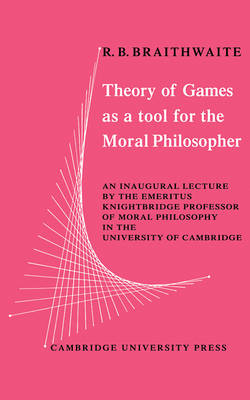
Theory of Games as a Tool for the Moral Philosopher
Seiten
2009
Cambridge University Press (Verlag)
978-0-521-11351-9 (ISBN)
Cambridge University Press (Verlag)
978-0-521-11351-9 (ISBN)
It is a common complaint against moral philosophers that their abstract theorising bears little relation to the practical problems of everyday life. With the help of the Theory of Games he shows how arbitration is possible between two neighbours, a jazz trumpeter and a classical pianist, whose performances are a source of mutual discord.
It is a common complaint against moral philosophers that their abstract theorising bears little relation to the practical problems of everyday life. Professor Braithwaite believes that this criticism need not be inevitable. With the help of the Theory of Games he shows how arbitration is possible between two neighbours, a jazz trumpeter and a classical pianist, whose performances are a source of mutual discord. The solution of the problem in the lecture is geometrical, and is based on the formal analogy between the logic of the situation and the geometry of a parabola. But an appendix provides the alternative algebraic treatment of a general two-person collaboration situation.
It is a common complaint against moral philosophers that their abstract theorising bears little relation to the practical problems of everyday life. Professor Braithwaite believes that this criticism need not be inevitable. With the help of the Theory of Games he shows how arbitration is possible between two neighbours, a jazz trumpeter and a classical pianist, whose performances are a source of mutual discord. The solution of the problem in the lecture is geometrical, and is based on the formal analogy between the logic of the situation and the geometry of a parabola. But an appendix provides the alternative algebraic treatment of a general two-person collaboration situation.
This book has no page contents.
| Erscheint lt. Verlag | 18.6.2009 |
|---|---|
| Zusatzinfo | Worked examples or Exercises |
| Verlagsort | Cambridge |
| Sprache | englisch |
| Maße | 127 x 203 mm |
| Gewicht | 90 g |
| Themenwelt | Geisteswissenschaften ► Philosophie ► Ethik |
| Mathematik / Informatik ► Mathematik ► Angewandte Mathematik | |
| Mathematik / Informatik ► Mathematik ► Finanz- / Wirtschaftsmathematik | |
| ISBN-10 | 0-521-11351-2 / 0521113512 |
| ISBN-13 | 978-0-521-11351-9 / 9780521113519 |
| Zustand | Neuware |
| Haben Sie eine Frage zum Produkt? |
Mehr entdecken
aus dem Bereich
aus dem Bereich


